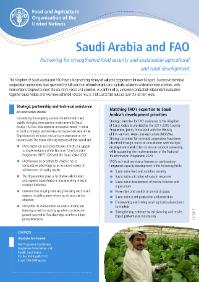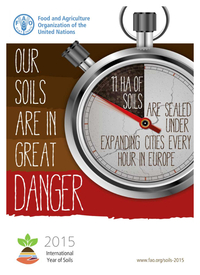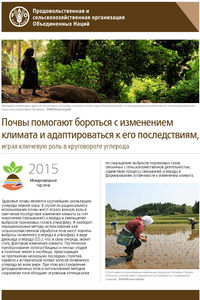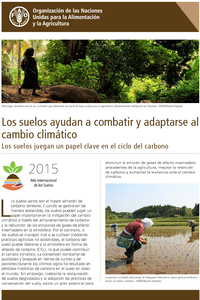Focal point
Location
The Food and Agriculture Organization of the United Nations leads international efforts to defeat hunger. Serving both developed and developing countries, FAO acts as a neutral forum where all nations meet as equals to negotiate agreements and debate policy. FAO is also a source of knowledge and information. We help developing countries and countries in transition modernize and improve agriculture, forestry and fisheries practices and ensure good nutrition for all. Since our founding in 1945, we have focused special attention on developing rural areas, home to 70 percent of the world's poor and hungry people.
Members:
Resources
Displaying 1821 - 1825 of 5074Saudi Arabia and FAO
The Kingdom of Saudi Arabia and FAO have a significant history of cooperation. For more than 50 years, FAO assistance has spanned the full spectrum of agricultural and rural development, with interventions carefully selected to meet top priority areas identified by the country and its regional setting. Some notable features of cooperation include the formulation of policy and regulatory frameworks, including national capacity development, and technical assistance to high-value horticulture.
Our Soils Are in Great Danger. 11 ha of Soils Are Sealed under Expanding Cities Every Hour in Europe
FAO Informative Material for the International Year of Soils (IYS 2015).
Почвы помогают бороться с изменением климата и адаптироваться к его последствиям, играя ключевую роль в круговороте углерода
Здоровые почвы являются крупнейшим хранилищем углерода земной коры. В случае их рационального использования почвы могут играть важную роль в смягчении последствий изменения климата за счет накопления (связывания) углерода и уменьшения выбросов парниковых газов в атмосферу.
Belarus and FAO
Belarus and FAO have been implementing a number of development programmes to encourage agro-industry growth, rural development and trade facilitation since 2005, when the country became a member of FAO. In providing assistance, FAO is and will be focusing on increasing efforts to prevent the African Swine Fever, to help eliminate obsolete pesticides, to harmonize the standards of quality for agricultural products with the European standards, to develop climate change projects and to provide training to the Belarusian agricultural specialists.
Los suelos ayudan a combatir y adaptarse al cambio climático
Los suelos sanos son el mayor almacén de carbono terrestre. Cuando se gestionan de manera sostenible, los suelos pueden jugar un papel importante en la mitigación del cambio climático a través del almacenamiento de carbono y la reducción de las emisiones de gases de efecto invernadero en la atmósfera.











